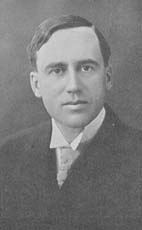William Melville Martin
William Melville Martin (born August 23, 1876 in Norwich , Ontario , † June 22, 1970 in Regina , Saskatchewan ) was a Canadian politician and judge . From October 20, 1916 to April 5, 1922 he was Prime Minister of Saskatchewan Province and Chairman of the Saskatchewan Liberal Party . From 1908 to 1916 he sat for the Liberal Party of Canada in the House , from 1941 to 1961 he presided over the Court of Appeal of Saskatchewan.
Studies and Federal Politics
Martin grew up in Huron County in southwestern Ontario. From 1894 he studied classical antiquity at the University of Toronto . In 1898 he graduated with honors and began studying education in Hamilton . He taught in Wellington County for two years and then returned to Toronto , where he studied law at Osgoode Hall Law School . In 1903 he joined the law firm of his cousin James Balfour in Regina . Two years later he married Florence Thompson, with whom he had three sons.
In the 1908 general election , Martin ran as a candidate for the Liberal Party of Canada and won in the Regina constituency. He established himself as an advocate for the interests of Western Canada and campaigned, among other things, for the construction of railway lines, lower freight tariffs and the establishment of wheat farmers' cooperatives. In the general election in 1911 he was re-elected.
prime minister
In 1916, the Saskatchewan provincial government was confronted with allegations of corruption. Prime Minister Thomas Walter Scott had health problems and resigned on October 16. The ruling Saskatchewan Liberal Party could not find a suitable successor at first and finally turned to the completely unencumbered Martin. He complied with the request and assumed responsibility for government on October 20. In the election for the legislative assembly of Saskatchewan in June 1917, the Liberals celebrated an overwhelming election victory and won 51 of 59 seats. Martin himself was elected in the Regina City constituency.
Movements like the United Farmers and the Progressive Party of Canada benefited from the latent discontent in the rural population and endangered the leadership of the Liberals. They were able to form minority governments in Ontario and Manitoba, and even a majority government in Alberta . In Saskatchewan, however, Martin succeeded in integrating the agrarian-populist circles by completely severing ties to the Liberal Party at the federal level in 1920 and bringing prominent peasant representatives such as Charles Avery Dunning into government. In the June 1921 election, the Saskatchewan Liberal Party suffered little losses.
However, when Martin actively campaigned for the Liberal Party of Canada before the general election in 1921 , he brought many representatives of the Progressive Party against him. The break in the provincial government eventually led to Martin's resignation on April 5, 1922, and his retirement from politics.
further activities
Shortly after his resignation, Martin was appointed a judge on the Saskatchewan Provincial Court of Appeals . His superior was Frederick Haultain , former Prime Minister of the Northwest Territories . In 1941, Martin himself took over the chairmanship of the court of appeal and held this office for twenty years, up to the old age of 84. During the Second World War he administered the fortunes of enemy aliens in Canada. In 1949 he headed a commission that had been entrusted with the revision of Canada's criminal law.
literature
- Gordon Barnhart : Saskatchewan Premiers of the Twentieth Century. Canadian Plains Research Center, Regina 2004. ISBN 0889771642 .
Web links
- William Melville Martin ( English, French ) In: The Canadian Encyclopedia .
- Article by William Melville Martin in the Encyclopedia of Saskatchewan
- William Melville Martin - biographical information on the website of the Canadian Parliament (English)
| personal data | |
|---|---|
| SURNAME | Martin, William Melville |
| BRIEF DESCRIPTION | Canadian politician |
| DATE OF BIRTH | August 23, 1876 |
| PLACE OF BIRTH | Norwich , Ontario |
| DATE OF DEATH | June 22, 1970 |
| Place of death | Regina , Saskatchewan |
